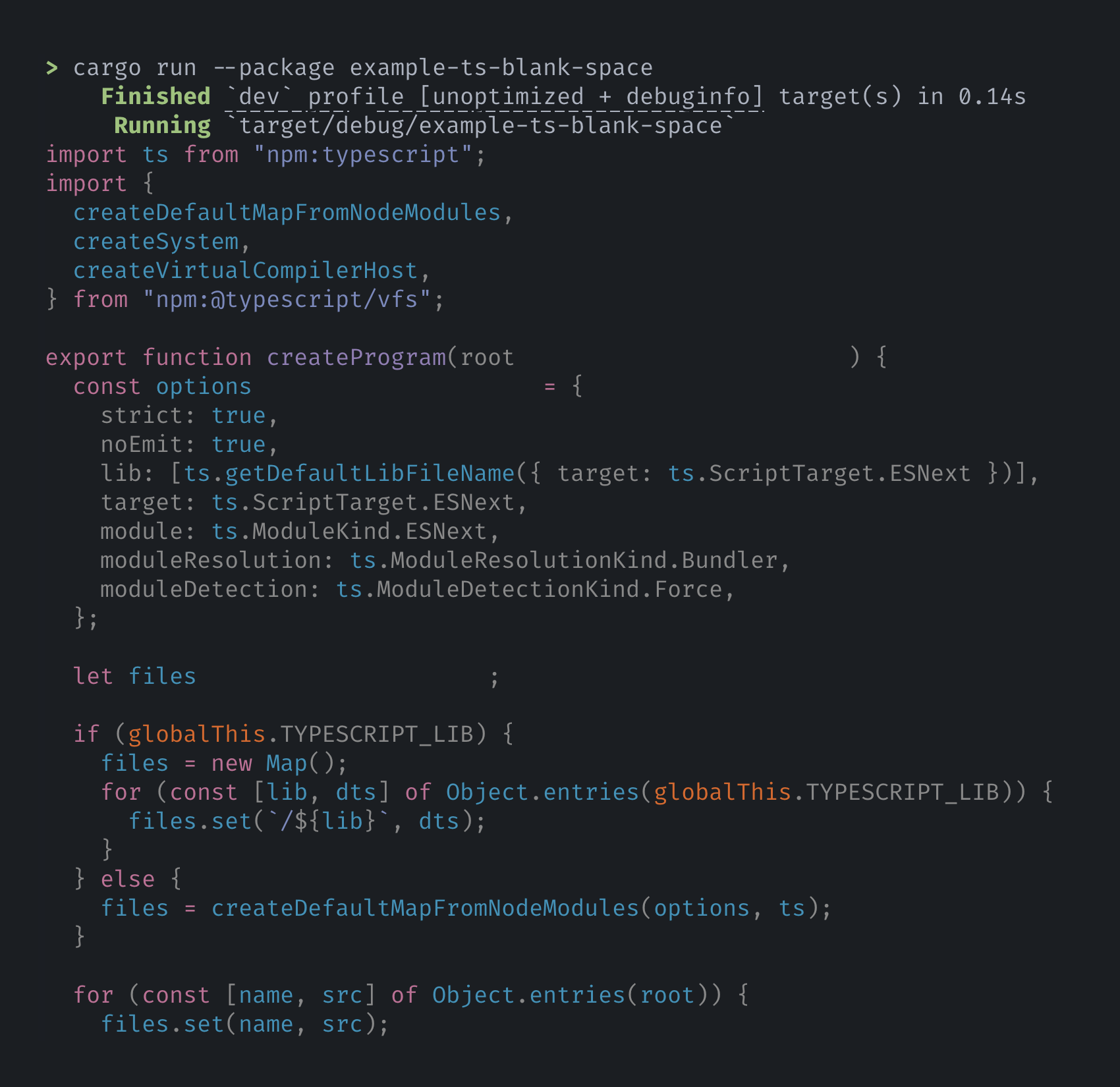Example: ts-blank-space
tip
For best results, view this page in the book.
ts-blank-space is a cool type-stripping TypeScript compiler. This example builds
upon the ts example to run ts-blank-space.
tip
"Type-stripping" means erasing TypeScript specific syntax and features from the source code so that it can be directly executed as JavaScript.
To run this example, run:
cargo run --package example-ts-blank-space
important
This example requires the deno CLI to build.

Output of this example. Notice the extra whitespace in declarations.
Embed ts-blank-space
use ferrosaur::js;
#[js(module("../dist/main.js", fast))]
struct Main;
#[js(interface)]
impl Main {
#[js(func(name = "default"))]
fn blank_space<S: serde::Serialize>(&self, src: serde<S>) -> serde<String> {}
// import { default as blank_space } from "../dist/main.js";
}
The file ../dist/main.js is emitted by esbuild during cargo build.
See build.ts which slightly processes the
ts-blank-space library so that it can be used in this example.
Setup the runtime
#[tokio::main]
async fn main() -> Result<()> {
let rt = &mut deno()?;
Initialize typescript
use example_ts::{inject_lib_dts, TypeScriptLib, TypeScriptVfs};
TypeScriptLib::side_module_init(rt).await?;
TypeScriptVfs::side_module_init(rt).await?;
TypeScriptLib and TypeScriptVfs are provided by the ts example.
inject_lib_dts(rt)?;
inject_lib_dts sets up some data that typescript requires in order to run.
See build.rs in the ts example for more info.
Initialize ts-blank-space
let ts = Main::main_module_init(rt).await?;
Run ts-blank-space on examples/ts/src/lib.ts
let path = Path::new(env!("CARGO_MANIFEST_DIR")).join("../ts/src/lib.ts");
let file = std::fs::read_to_string(&path)?;
let js = ts.blank_space(&file, rt)?;
Evaluate the type-stripped result
#[js(value(of_type(v8::Object)))]
struct Example;
let module: Example = {
let url = Url::from_directory_path(env!("CARGO_MANIFEST_DIR"))
.unwrap()
.join("ad-hoc.js")?;
let id = rt.load_side_es_module_from_code(&url, js.clone()).await?;
rt.mod_evaluate(id).await?;
rt.get_module_namespace(id)?.into()
};
use example_ts::Compiler;
impl Compiler for Example {}
example_ts::Compiler describes the JavaScript APIs
exported by lib.ts.
Here we are saying Example, our ad-hoc ES module produced by ts-blank-space, comforms
to the interface as described by the Compiler trait, which is correct.
Pretty-print the type-stripped result
use bat::PrettyPrinter;
PrettyPrinter::new()
.input_from_bytes(js.as_bytes())
.language("javascript")
.theme("GitHub")
.print()?;
println!();
PrettyPrinter courtesy of bat.
Use lib.ts to type check itself
let root = HashMap::new().tap_mut(|map| drop(map.insert("src/lib.ts".into(), file)));
let errors = module
.create_program(root, rt)?
.print_diagnostics(true, rt)?;
println!("{errors}");
{
let mut settings = insta::Settings::clone_current();
settings.set_description("script compiled with ts-blank-space");
settings.set_prepend_module_to_snapshot(false);
settings.set_snapshot_path("../tests/snapshots");
settings.bind(|| insta::assert_snapshot!(js));
}
Ok(())
}
Additional setup code
use std::{collections::HashMap, path::Path};
use anyhow::Result;
use tap::Tap;
use example_runtime::{
deno,
deno_core::{self, serde, url::Url},
};